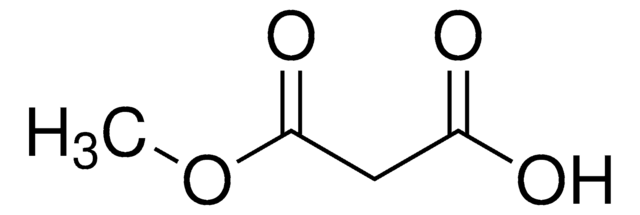302341
Acetoxyacetic acid
99%
Synonym(s):
α-Acetoxyacetic acid, (Acetyloxy)acetic acid, 2-(Acetyloxy)acetic acid, 2-Hydroxyacetic acid acetate, Acetylglycolic acid, O-Acetylglycolic acid
Sign Into View Organizational & Contract Pricing
All Photos(2)
About This Item
Linear Formula:
CH3CO2CH2CO2H
CAS Number:
Molecular Weight:
118.09
EC Number:
MDL number:
UNSPSC Code:
12352100
PubChem Substance ID:
NACRES:
NA.22
Recommended Products
Quality Level
Assay
99%
bp
141-142 °C/12 mmHg (lit.)
mp
67-69 °C (lit.)
functional group
carboxylic acid
ester
SMILES string
CC(=O)OCC(O)=O
InChI
1S/C4H6O4/c1-3(5)8-2-4(6)7/h2H2,1H3,(H,6,7)
InChI key
MLXDUYUQINCFFV-UHFFFAOYSA-N
General description
Acetoxyacetic acid is kinetically stable degradation product of oxidative degradation of 1,3-dialkylimidazolium ionic liquids in hydrogen peroxide/aceticacid aqueous medium assisted by ultrasonic chemical irradiation. It is an intermediate formed during reactions of manganic acetate in glacial acetic acid with benzene (100°C), chlorobenzene, or toluene.
Application
Acetoxyacetic acid was used in preparation of tert-butyl glycolate.
Signal Word
Danger
Hazard Statements
Precautionary Statements
Hazard Classifications
Eye Dam. 1 - Skin Corr. 1B
Storage Class Code
8A - Combustible corrosive hazardous materials
WGK
WGK 3
Flash Point(F)
Not applicable
Flash Point(C)
Not applicable
Personal Protective Equipment
dust mask type N95 (US), Eyeshields, Gloves
Choose from one of the most recent versions:
Already Own This Product?
Find documentation for the products that you have recently purchased in the Document Library.
Customers Also Viewed
Intermediate steps in autoxidation: III. Reactions of MnIII acetate in acetic acid with benzene, chlorobenzene, and toluene.
Van der PRE, et al.
J. Catal., 10(1), 52-59 (1968)
Xuehui Li et al.
Dalton transactions (Cambridge, England : 2003), (19)(19), 1875-1880 (2007-08-19)
A highly efficient process for oxidative degradation of 1,3-dialkylimidazolium ionic liquids in hydrogen peroxide/acetic acid aqueous medium assisted by ultrasonic chemical irradiation is, for the first time, described. It is shown that more than 93% of the 1,3-dialkylimidazolium cation with
Synthetic studies of pyridomycin. II. Synthesis of a model twelve-membered ring compound related to pyridomycin.
Kinoshita M and Awamura M.
Bulletin of the Chemical Society of Japan, 51(3), 869-871 (1978)
Amberlyn M Wands et al.
ACS infectious diseases, 4(5), 758-770 (2018-02-08)
Cholera toxin (CT) enters host intestinal epithelia cells, and its retrograde transport to the cytosol results in the massive loss of fluids and electrolytes associated with severe dehydration. To initiate this intoxication process, the B subunit of CT (CTB) first
Our team of scientists has experience in all areas of research including Life Science, Material Science, Chemical Synthesis, Chromatography, Analytical and many others.
Contact Technical Service













